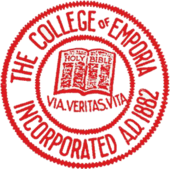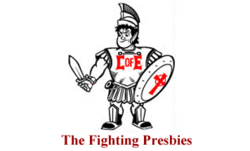Organization:College of Emporia
 | |
| Type | Private |
|---|---|
| Active | 1882–1974 |
| Affiliation | Presbyterian Church |
| Location | Emporia , |
| |u}}rs | Red and White |
| Mascot | Fighting Presbies |
The College of Emporia was established in 1882 in Emporia, Kansas, and was associated with the Presbyterian church. The college officially closed in 1974.[1] The Registrar's office at Emporia State University is the official custodian of the transcripts for the former College of Emporia.[2]
The college campus was purchased by The Way International for $694,000[3] and was operated as The Way College of Emporia from 1975 until 1989.
History
Founded in 1882, the College of Emporia was one of two higher education institutes in Emporia. The other institute at the time was what later became Emporia State University. Because Emporia had these two colleges before 1900 it was sometimes called the "Athens of Kansas ." In March 1909, the Lewis Academy, a Presbyterian school in Wichita, consolidated with the College of Emporia.
In 1884 William Allen White enrolled at the College of Emporia. Colonel John Byers Anderson of Manhattan, Kansas, donated his personal library to the college in 1888.
Twelve years later, a Carnegie grant provided the funds for the college to build the Anderson Memorial Library, in memory of John B. Anderson, whom Carnegie had known when younger and who later served on the board of trustees of the College of Emporia.[4] The library was placed on the National Register of Historic Places on June 25, 1987.
Athletics

Football was established in the late 1890s and existed until the college closed its doors in 1974. The team known as the red and white "Fighting Presbies" had a proud tradition—over 70 years of football the college won 14 conference football championships, including an undefeated, untied, and unscored on season in 1928.
In 1955, alumnus Lem Harkey was drafted in the sixth round by the Pittsburgh Steelers.[6] The college's most famous player and honored coach was Homer Woodson Hargiss.
References
- ↑ Higher Learning accreditation records
- ↑ "Emporia State University, Registration". http://www.emporia.edu/regist/trnscpt/other.htm.
- ↑ Juedes, John (2000). "The Incredible Shrinking Way "Selling the Store"". http://www.precastconcrete.org/~messiah7/tdy_shrinking.htm.
- ↑ Gardiner, Allen. "Anderson Memorial Library". The Carnegie Legacy in Kansas. Archived from the original on 5 August 2012. https://web.archive.org/web/20120805114129/http://skyways.lib.ks.us/carnegie/updates/esu.html. Retrieved 12 February 2014.
- ↑ "College of Emporia Alumni Association". http://www.c-of-e.org/.
- ↑ "College of Emporia Players/Alumni". Pro-Football Reference.com. https://www.pro-football-reference.com/colleges/colofemporia/.
External links
- The Carnegie Legacy in Kansas, Anderson Memorial Library
- Emporia - Home of William Allen White
- Then and Now: Lewis Academy
- The C of E boys are back in Kansas for a College Reunion
- College of Emporia; May 1971
